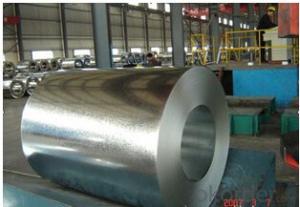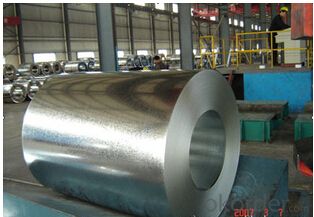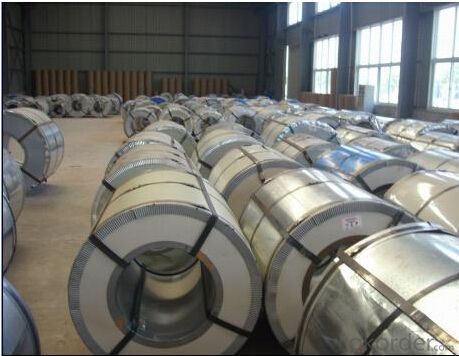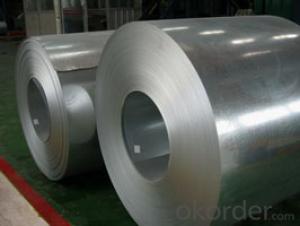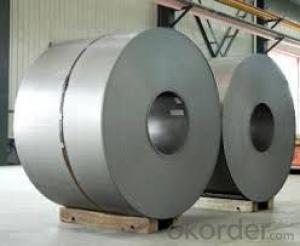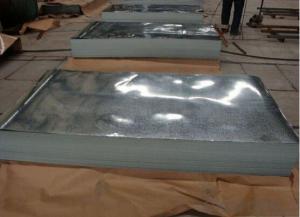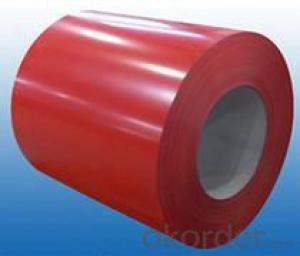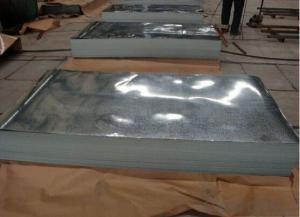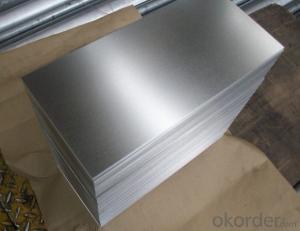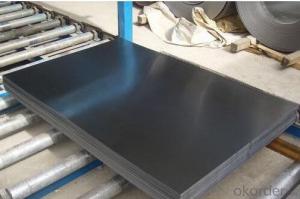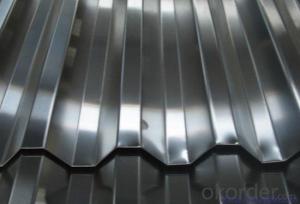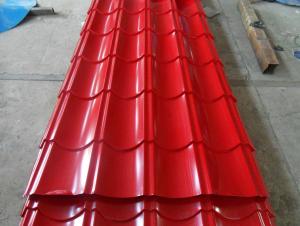Best Quality of Galvanized Steel Coil from China
- Loading Port:
- Tianjin
- Payment Terms:
- TT OR LC
- Min Order Qty:
- 50 m.t.
- Supply Capability:
- 5000 m.t./month
OKorder Service Pledge
OKorder Financial Service
You Might Also Like
1. Hot-Dip Galvanized Steel Coil Description:
Hot-dip galvanized steel coil are available with a pure zinc coating through the hot-dip galvanizing process. It offers the economy, strength and formability of steel combined with the corrosion resistance of zinc. The hot-dip process is the process by which steel gets coated in layers of zinc to protect against rust. It is especially useful for countless outdoor and industrial application.
2.Main Features of the Hot-Dip Galvanized Steel Coil:
• Excellent process capability
• Smooth and flat surface
• Workability, durability
• Excellent heat resistance performance
• High strength
• Good formability
• Good visual effect
3.Hot-Dip Galvanized Steel Coil Images
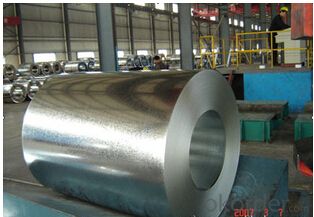
4.Hot-Dip Galvanized Steel Coil Specification
Standard: AISI, ASTM, BS, DIN, GB, JIS
Grade: SPCC, SPCD, Q195, DX51D
Thickness: 0.15-5.0mm
Model Number: coil
Type: Steel Coil
Technique: Cold Rolled
Surface Treatment: Galvanized
Application: Container Plate
Special Use: High-strength Steel Plate
Width: 600-1250mm
Length: depends
commodity: hot dipped galvanized steel coil
technique: cold rolled
thickness: 0.15-5.0mm
width: 600-1500mm
surface treatment: galvanized
zinc coating: 50-275g/m2
coil weight: 3-7 tons
coil ID: 508/610mm
spangle: zero spangle, regular spangle, small spangle, big spangle
payment term: by L/C or T/T
5.FAQ of Hot-Dip Galvanized Steel Coil
What’s the application of this product?
There are many applications for this product. For example, roofing, cladding, decking, tiles, sandwich walls, etc.
What’s the coating composition of Hot-Dip Galvanized Steel Coil?
The coating composition is 55% aluminium in weight ratio, 43.4% zinc, and 1.5% silicon, with excellent corrosion and heat resistance performance.
- Q: What is the price range of steel sheets?
- The price range of steel sheets can vary depending on several factors such as the type and grade of steel, the thickness and size of the sheet, and the market conditions. Generally, the price range for steel sheets can range from around $0.60 to $1.50 per pound. However, it is essential to keep in mind that these prices are approximate and can change frequently due to fluctuations in the steel market and other economic factors. It is advisable to check with local suppliers or online platforms to get the most accurate and up-to-date pricing information for steel sheets.
- Q: What are the different types of steel sheet finishes for automotive applications?
- There are several different types of steel sheet finishes commonly used in automotive applications. These finishes are applied to the surface of the steel sheet to enhance its appearance, durability, and corrosion resistance. One common type of finish is the mill finish, which is the natural finish of the steel sheet after it has been hot or cold rolled. This finish has a dull gray appearance and is typically used for applications where aesthetics are not a major concern. Another popular finish is the galvanized finish, which involves coating the steel sheet with a layer of zinc to protect it from corrosion. This finish provides excellent corrosion resistance and is commonly used in automotive body panels and structural components. There is also the painted finish, where the steel sheet is coated with a layer of paint. This finish not only improves the aesthetics of the steel sheet but also provides an added layer of protection against corrosion. Painted finishes can come in a variety of colors and textures, allowing for customization and branding options. Additionally, there are specialized finishes such as the electro-galvanized finish, which involves applying a thin layer of zinc to the steel sheet through an electroplating process. This finish provides enhanced corrosion resistance and is commonly used in automotive parts that require a high level of protection against rust. Lastly, there is the brushed or polished finish, which involves mechanically polishing the surface of the steel sheet to create a smooth and reflective appearance. This finish is often used for decorative purposes in automotive applications, such as trim or accents. In summary, the different types of steel sheet finishes for automotive applications include mill finish, galvanized finish, painted finish, electro-galvanized finish, and brushed/polished finish. Each type of finish offers unique benefits in terms of appearance, durability, and corrosion resistance, allowing manufacturers to choose the most suitable option for their specific automotive application.
- Q: What are the different types of steel sheet finishes for architectural applications?
- Architectural applications commonly utilize various types of steel sheet finishes, each serving a different purpose. These finishes not only enhance the visual appeal of steel sheets but also offer protection against corrosion and environmental factors. 1. Mill Finish: The most basic type of finish, the steel sheet remains as it is from the mill. It has a dull, gray appearance and is typically used for applications where aesthetics are not a priority. 2. Brushed Finish: Also known as a satin finish, this type of finish is achieved by brushing the steel sheet with a fine abrasive material. It results in a smooth, linear texture, giving the surface a contemporary and elegant look. 3. Polished Finish: Achieved by polishing the steel sheet with abrasive materials, this finish creates a smooth and reflective surface. It offers a high-gloss, mirror-like appearance, making it suitable for applications that require a sophisticated and luxurious look. 4. Embossed Finish: This finish involves pressing the steel sheet with embossing tools to create textured patterns or designs on the surface. It provides a unique and decorative appearance, ideal for architectural applications that require visual interest. 5. Patterned Finish: This finish entails applying patterns or textures onto the steel sheet using techniques like etching, laser cutting, or perforating. It creates visually appealing surfaces with intricate designs, suitable for both functional and decorative purposes. 6. Powder Coated Finish: This finish involves electrostatically applying a layer of dry powder paint to the steel sheet, which is then cured under heat. It offers a durable and vibrant finish, available in a wide range of colors and textures. This finish is highly resistant to chipping, scratching, and fading, making it ideal for exterior architectural applications. 7. Galvanized Finish: This finish is achieved by applying a layer of zinc coating onto the steel sheet through galvanization. It provides excellent corrosion resistance, making it suitable for outdoor architectural applications exposed to harsh environments. In conclusion, the choice of steel sheet finish depends on the desired aesthetics, durability, and environmental conditions of the architectural application.
- Q: How do steel sheets perform in UV resistance?
- Steel sheets do not have inherent UV resistance as they are prone to corrosion when exposed to ultraviolet (UV) radiation. However, the addition of protective coatings or finishes can enhance their UV resistance and significantly increase their lifespan when exposed to sunlight.
- Q: What are the weight and load-bearing capacities of steel sheets?
- The weight and load-bearing capacities of steel sheets can vary depending on the specific grade and thickness of the sheet. However, steel sheets are known for their high strength and durability, making them capable of supporting heavy loads. It is best to consult the manufacturer or reference technical specifications for accurate weight and load-bearing capacity information for a particular steel sheet.
- Q: Can steel sheets be bent or folded?
- Yes, steel sheets can be bent or folded to a certain extent depending on their thickness and tensile strength.
- Q: What is the process of applying protective coatings to steel sheets?
- The process of applying protective coatings to steel sheets involves several steps. First, the steel sheets are cleaned to remove any dirt, grease, or other contaminants. This can be done through various methods such as chemical cleaning, power washing, or sandblasting. After cleaning, the sheets are dried thoroughly to ensure a clean and dry surface. Next, a primer or undercoat is applied to the steel sheets. The primer helps in promoting adhesion and corrosion resistance. It is essential to choose a primer that is compatible with the type of coating being applied. Once the primer is dry, the protective coating is applied. This can be done through methods like spray painting, dip coating, or electrostatic coating. The type of coating used depends on the specific requirements and properties desired for the steel sheets. After application, the coated steel sheets are cured or dried, typically through air drying or baking in an oven. This ensures that the coating adheres properly and forms a protective layer on the steel surface. Overall, the process of applying protective coatings to steel sheets involves cleaning, priming, coating, and curing steps to enhance the durability, corrosion resistance, and aesthetic appearance of the steel sheets.
- Q: How do you transport steel sheets safely?
- To transport steel sheets safely, it is important to use appropriate lifting equipment such as cranes or forklifts with proper rated capacity. The sheets should be securely strapped or clamped together to prevent shifting during transportation. Additionally, using protective covers or padding can minimize the risk of scratches or damage. Proper planning, training, and adherence to safety protocols are crucial to ensure safe transportation of steel sheets.
- Q: What are the electrical conductivity properties of steel sheets?
- Steel sheets have high electrical conductivity properties due to the presence of metallic bonds between iron atoms, allowing for the easy flow of electrons through the material.
- Q: Can steel sheets be used for mezzanine flooring?
- Indeed, mezzanine flooring can make use of steel sheets. Mezzanine flooring benefits from the numerous advantages provided by steel sheets, such as their strength, durability, and versatility. Steel sheets are capable of withstanding substantial loads and offer a dependable and stable solution for flooring needs. Moreover, they can be easily tailored to suit specific dimensions and requirements, making them adaptable for various mezzanine designs. Additionally, steel sheets exhibit resistance to fire, moisture, and pests, guaranteeing a flooring option that is long-lasting and requires minimal maintenance. In summary, due to their robustness, durability, and adaptability, steel sheets are a popular choice for mezzanine flooring.
Send your message to us
Best Quality of Galvanized Steel Coil from China
- Loading Port:
- Tianjin
- Payment Terms:
- TT OR LC
- Min Order Qty:
- 50 m.t.
- Supply Capability:
- 5000 m.t./month
OKorder Service Pledge
OKorder Financial Service
Similar products
Hot products
Hot Searches
Related keywords
